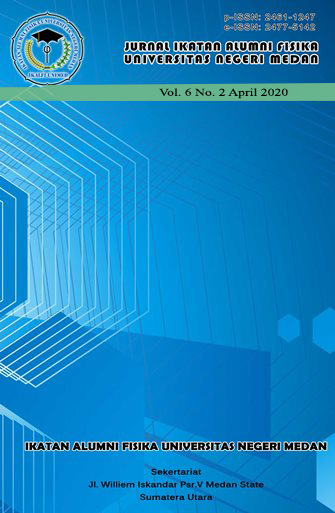KELAYAKAN LEMBAR KEGIATAN PESERTA DIDIK (LKPD) FLUIDA DINAMIS BERBASIS INKUIRI TERBIMBINGBERBANTUAN SIMULASI PhET
DOI:
https://doi.org/10.24114/jiaf.v6i2.18803Keywords:
fluida dinamis, inkuiri terbimbing, pengembangan LKPD, simulasi PhETAbstract
AbstrakPenelitian ini bertujuan untuk mengetahui kelayakan LKPD berbasis inkuiri terbimbing berbantuan simulasi PhET untuk digunakan dalam proses pembelajaran Fluida Dinamis berdasarkan hasil validasi ahli dan hasil uji coba LKPD. Data penelitian diperoleh melalui pemberian angket dan lembar penilaian yang dianalisis menggunakan teknik deskriptif kualitatif dan kuantitatif. Dari hasil analisis data diperoleh validasi ahli materi sebesar 95,5%, ahli pembelajaran 90,63%, penilaian guru fisika sebesar 95,84% dengan masing-masing persentase tersebut termasuk dalam kriteria sangat baik. Hasil uji coba LKPD diperoleh keterampilan inkuiri siswa sebesar 79,24% dalam kriteria baik dan nilai rata-rata siswa 79,3 termasuk dalam kriteria tuntas. Berdasarkan hasil validasi, penilaian guru fisika dan hasil uji coba LKPD dapat disimpulkan LKPD fisika berbasis inkuiri terbimbing berbantuan simulasi PhET layak digunakan dalam proses pembelajaran Fluida Dinamis.AbstracThis study aims to determine the feasibility of guided inquiry-based LKPD assisted by PhET simulation to be used in the Dynamic Fluid learning process based on the results of expert validation and the results of LKPD trials. The research data was obtained through giving questionnaires and assessment sheets which were analyzed using qualitative and quantitative descriptive techniques. From the results of data analysis obtained material expert validation of 95,5%, learning experts 90,63%, physics teacher assessment of 95,84% with each percentage included in the very good criteria . The results of the LKPD trial obtained student inquiry skills by 79,24% in the good criteria and the average value of students 79,3 included in the criteria of completion. Based on the results of the validation, the physics teacher's assessment and the results of the LKPD trial, it can be concluded that the guided inquiry-based LKPD assisted by PhET simulation is feasible for use in the Dynamic Fluid learning process.References
Finkelstein, N., Adams, W., Keller, C., Perkins, K.,Wieman, C., & P. E. (2006). High-Tech Tools for Teaching Physics: the Physics Education Technology Project. MERLOT Journal of Online Learning and Teaching, 111.
Khabibah, N., Jalmo, T., dan Suyatna, A. (2018). The Use Of Inquiry-Based Student Worksheet To Instills Science Generic Skill Of The Students. International Journal of Research“ GRANTHAALAYAH. 6 (6), 4-6.
Koksal, E. A., & Berberoglu, G. (2014). The Effect of Guided-Inquiry Instruction on 6th Grade Turkish Students™ Achievement, Science Process Skills, and Attitudes Toward Science. International Journal of Science Education, 36(1), 66“78.
Misbah, Dewantara,D.,Hasan, S.M.,dan Annur,S. 2018. The Development Of Student Worksheet By Using Guided Inquiry Learning Model To Train Student's Scientific Attitude. Unnes Science Education Journal. 7 (1), 22-24.
Nababan, E. D dan Sirait, M. (2016). Pengaruh Model Pembelajaran Inquiry Training Berbantuan Media PhET Terhadap Hasil Belajar Siswa Pada Materi Fluida Statis Kelas X semester II SMA Negeri 1 Raya. Jurnal Ikatan Alumni Fisika Universitas Negeri Medan. 2 (3), 8-9.
Ozdemir, O., & Isik, H. (2015). Effect of Inquiry-Based Science Activities on Prospectivcess Skills and Inquiry Strategiese Elemtary Teachers Use of Science Pro. Journal of Turkish Science Education, 43-56.
Perkins, K., Adams, W., & Dubson, M. (2004). PhET: InteractiveSimulations for Teaching and Learning Physics. Physics Teacher, 1-8.
Prastowo, A. (2015). Panduan Kreatif Membuat Bahan Ajar Inovatif. Yogyakarta: Diva Press.
Rokhmah, A. & Madlazim. (2015). Pengembangan Lembar Kerja Siswa (LKS) Berbasis Inkuiri Terbimbing Untuk Melatihkan Keterampilan Siswa Dalam Melakukan Eksperimen Pada Materi Ajar Sumber Energi Terbarukan. Jurnal Inovasi Pendidikan Fisika (JIPF). 4(2), 88-91.
Sani, R.A. 2014. Pembelajaran Saintifik Untuk Kurikulum 201. Jakarta: Bumi Aksara.
Taslidere. (2013). The Effect of Concept Cartoon Worksheets on Student™s Conceptual Understandings of Geometrical Optics. Jurnal Education and Science 2013, 38(167), 144“161.
Thiagarajan, S., Semmel, D., & Semmel M. (1974). Instructional Development for Training Teachers of Expectional Children. Minneapolis, Minnesota: University Of Minnesota.
Trowbridge, L.W., & R.W. Bybee. 1990. Becoming Secondary School Science Teacher. Melbourne: Merill Publishing Company.
Downloads
Published
Issue
Section
License
Copyright (c) 2020 JURNAL IKATAN ALUMNI FISIKA UNIVERSITAS NEGERI MEDAN

This work is licensed under a Creative Commons Attribution 4.0 International License.
Authors who publish with this journal agree to the following terms:- Authors retain copyright and grant the journal right of first publication with the work simultaneously licensed under a Creative Commons Attribution License that allows others to share the work with an acknowledgement of the work's authorship and initial publication in this journal.
- Authors are able to enter into separate, additional contractual arrangements for the non-exclusive distribution of the journal's published version of the work (e.g., post it to an institutional repository or publish it in a book), with an acknowledgement of its initial publication in this journal.
- Authors are permitted and encouraged to post their work online (e.g., in institutional repositories or on their website) prior to and during the submission process, as it can lead to productive exchanges, as well as earlier and greater citation of published work (See The Effect of Open Access).


 Jl. Williem Iskandar Psr. V, Medan Estate, Kec. Percut Sei Tuan, Kabupaten Deli Serdang, Sumatera Utara 20221
Jl. Williem Iskandar Psr. V, Medan Estate, Kec. Percut Sei Tuan, Kabupaten Deli Serdang, Sumatera Utara 20221